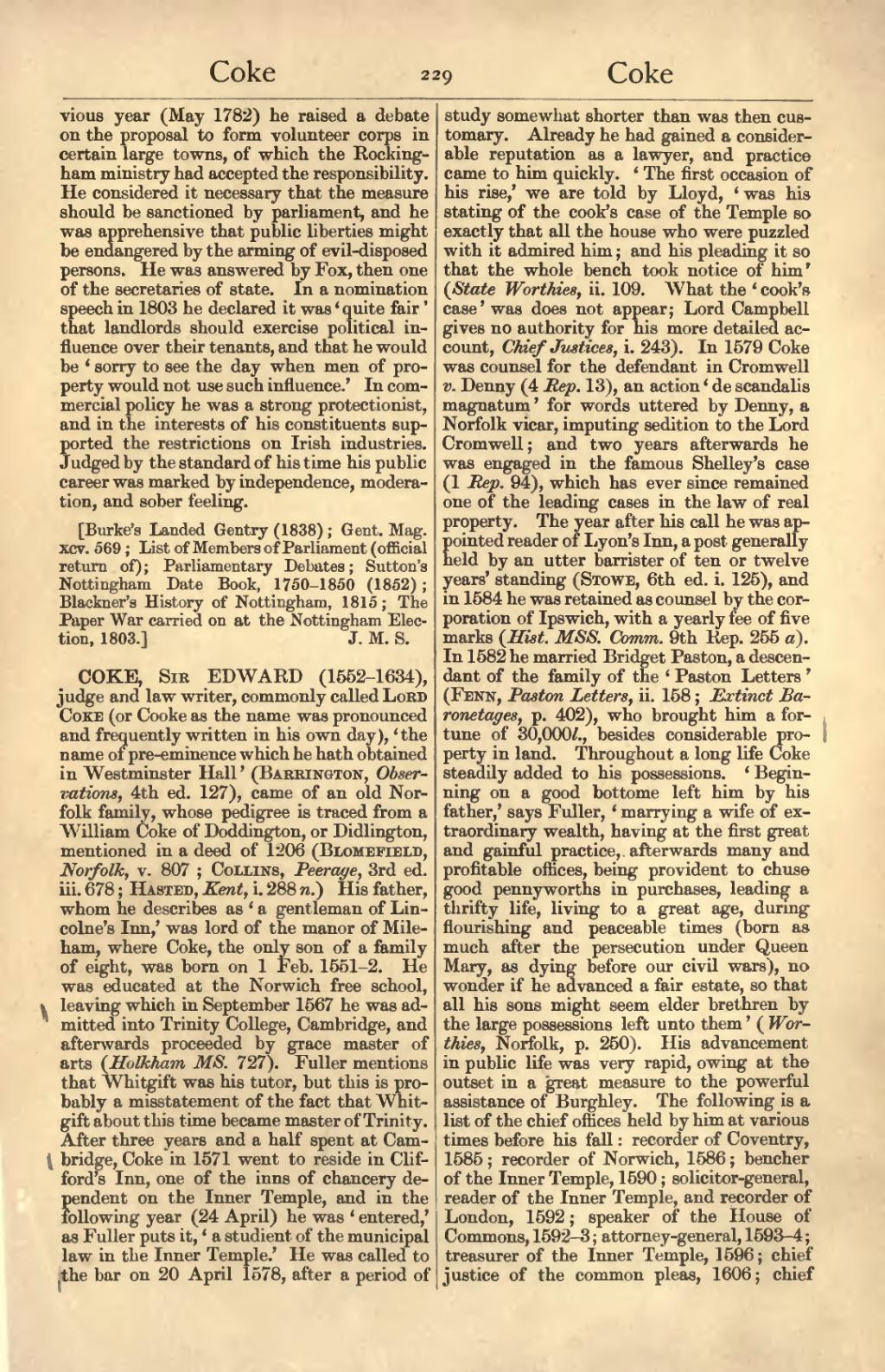vious year (May 1782) he raised a debate on the proposal to form volunteer corps in certain large towns, of which the Rockingham ministry had accepted the responsibility. He considered it necessary that the measure should be sanctioned by parliament, and he was apprehensive that public liberties might be endangered by the arming of evil-disposed persons. He was answered by Fox, then one of the secretaries of state. In a nomination speech in 1803 he declared it was 'quite fair' that landlords should exercise political influence over their tenants, and that he would be 'sorry to see the day when men of property would not use such influence.' In commercial policy he was a strong protectionist, and in the interests of his constituents supported the restrictions on Irish industries. Judged by the standard of his time his public career was marked by independence, moderation, and sober feeling.
[Burke's Landed Gentry (1838); Gent. Mag. xcv. 569; List of Members of Parliament (official return of); Parliamentary Debates; Button's Nottingham Date Book, 1750-1850 (1852); Blackner's History of Nottingham, 1815; The Paper War carried on at the Nottingham Election, 1803.]
COKE, Sir EDWARD (1552–1634), judge and law writer, commonly called Lord Coke (or Cooke as the name was pronounced and frequently written in his own day), 'the name of pre-eminence which he hath obtained in Westminster Hall' (Barrington, Observations, 4th ed. 127), came of an old Norfolk family, whose pedigree is traced from a William Coke of Doddington, or Didlington, mentioned in a deed of 1206 (Blomefield, Norfolk, v. 807; Collins, Peerage, 3rd ed. iii. 678; Hasted, Kent, i. 288 n.) His father, whom he describes as 'a gentleman of Lincolne's Inn,' was lord of the manor of Mileham, where Coke, the only son of a family of eight, was born on 1 Feb. 1551-2. He was educated at the Norwich free school, leaving which in September 1567 he was admitted into Trinity College, Cambridge, and afterwards proceeded by grace master of arts (Holkham MS. 727). Fuller mentions that Whitgift was his tutor, but this is probably a misstatement of the fact that Whitgift about this time became master of Trinity. After three years and a half spent at Cambridge, Coke in 1571 went to reside in Clifford's Inn, one of the inns of chancery dependent on the Inner Temple, and in the following year (24 April) he was 'entered,' as Fuller puts it, 'a studient of the municipal law in the Inner Temple.' He was called to the bar on 20 April 1578, after a period of study somewhat shorter than was then customary. Already he had gained a considerable reputation as a lawyer, and practice came to him quickly. 'The first occasion of his rise,' we are told by Lloyd, 'was his stating of the cook's case of the Temple so exactly that all the house who were puzzled with it admired him; and his pleading it so that the whole bench took notice of him' (State Worthies, ii. 109. What the 'cook's case' was does not appear; Lord Campbell gives no authority for his more detailed account, Chief Justices, i. 243). In 1579 Coke was counsel for the defendant in Cromwell v. Denny (4 Rep. 13), an action 'de scandalis magnatum' for words uttered by Denny, a Norfolk vicar, imputing sedition to the Lord Cromwell; and two years afterwards he was engaged in the famous Shelley's case (1 Rep. 94), which has ever since remained one of the leading cases in the law of real property. The year after his call he was appointed reader of Lyon's Inn, a post generally held by an utter barrister of ten or twelve years' standing (Stowe, 6th ed. i. 125), and in 1584 he was retained as counsel by the corporation of Ipswich, with a yearly fee of five marks (Hist. MSS. Comm. 9th Rep. 255 a). In 1582 he married Bridget Paston, a descendant of the family of the 'Paston Letters' (Fenn, Paston Letters, ii. 158; Extinct Baronetages, p. 402), who brought him a fortune of 30,000l., besides considerable property in land. Throughout a long life Coke steadily added to his possessions. 'Beginning on a good bottome left him by his father,' says Fuller, 'marrying a wife of extraordinary wealth, having at the first great and gainful practice, afterwards many and profitable offices, being provident to chuse good pennyworths in purchases, leading a thrifty life, living to a great age, during flourishing and peaceable times (born as much after the persecution under Queen Mary, as dying before our civil wars), no wonder if he advanced a fair estate, so that all his sons might seem elder brethren by the large possessions left unto them' (Worthies, Norfolk, p. 250). His advancement in public life was very rapid, owing at the outset in a great measure to the powerful assistance of Burghley. The following is a list of the chief offices held by him at various times before his fall: recorder of Coventry, 1585; recorder of Norwich, 1586; bencher of the Inner Temple, 1590; solicitor-general, reader of the Inner Temple, and recorder of London, 1592; speaker of the House of Commons, 1592-3; attorney-general, 1593-4; treasurer of the Inner Temple, 1596; chief justice of the common pleas, 1606; chief
